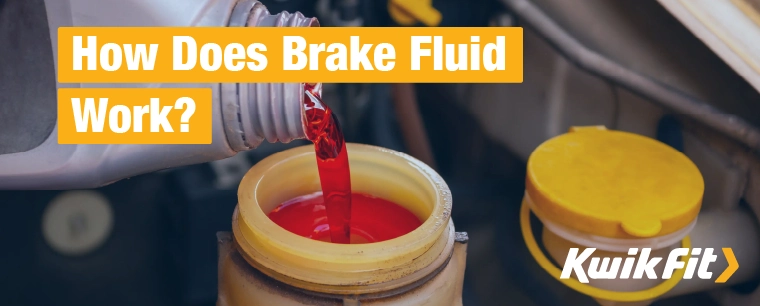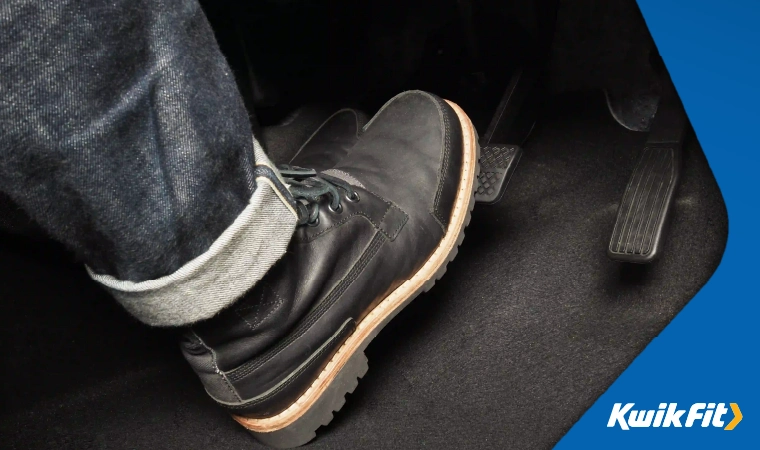How Does Brake Fluid Work?
Jack Dreyer | Friday 22nd September 2023 8:00am

A crucial part of your carís functionality, brakes are typically near the top of the priority list when it comes to checking that the elements of your car are working as they should.
There are multiple components of your carís brakes that need to be working together to keep things running smoothly. That said, some of the components you might have heard more about than others include: the brake pedal, brake lines, brake discs, and brake pads.
But what about brake fluid? Also known as hydraulic fluid, brake fluid is an essential aspect of your braking system. It not only amplifies your carís braking force but it also acts as a lubricant, and prevents corrosion in moving parts of your brakes. Simply put, without brake fluid, your brakes wouldnít work. You can find out more about why brake fluid is important here Ė but stick around to dive into how it works.
How brake fluid works
Brake fluid is part of the braking process from the moment you put your foot down to brake. Hereís how it all comes together:
- When you press down on your brake pedal, the pistons inside the master cylinder (which lives within the engine compartment) compress to allow the brake fluid to travel under pressure.
- The compression from the pistons increases the pressure within the brake lines which is where the pressurised brake fluid is contained.
- The brake lines divert the force of you pushing down on the brake pedal into the front and rear brakes of your car, using the pressurised brake fluid.
- The brake fluid then converts the energy used to push down the brake pedal into braking pressure that causes the brake pads to squeeze the brake rotors.
- This leads the rotors to slow down and brings them to a halt.
The braking system
So, as such an important part of your brake system, how does brake fluid work?
Brake fluid is part of the braking process from the moment you put your foot down to brake. When you press down on your brake pedal, the pistons inside the master cylinder, which lives within the engine compartment, compress to allow the brake fluid to travel under pressure. The compression from the pistons increases the pressure within the brake lines which is where the pressurised brake fluid is contained.
The brake lines divert the force of you pushing down on the brake pedal into the front and rear brakes of your car using the pressurised brake fluid. The brake fluid then converts the energy used to push down the brake pedal into braking pressure that causes the brake pads to squeeze the brake rotors. This leads the rotors to slow down and brings them to a halt.
Looking to learn a bit more about your carís brakes outside of the brake fluid? We have plenty of information available for you to get to grips with on our brake information page.

Keeping your brake fluid at its best
Your brake fluid is best when it is fresh and uncontaminated. In this state, your braking system will work properly and the car will brake efficiently when you put your foot down on the brake pedal.
As the brake fluid also acts as a lubricant to other moving parts of your braking system, it can absorb any moisture that might come from those components. And, because of the elements of the car that the brake fluid comes into contact with, itís also subjected to high temperatures ó which degrades the quality over time.
The more water that enters your brake fluid, the further diluted it becomes. This then lowers the temperature at which the fluid boils, which can result in your brakes actually failing to stop your car.
Of course, this is generally a gradual process and youíll notice your brakesí capability slackening with time Ė but itís well worth getting your brake fluid checked every year or so (or before if you notice a problem). Regular checks of your brake fluid are typically covered by interim or full car servicing.
Keep in mind, too, that brake fluid levels can decrease over time Ė whether because of a leak or because theyíre simply working hard to bring worn brake pads to a stop. If your brake fluid just needs a top-up, read our handy guide.
Kwik Fit brake services
Here at Kwik Fit, we offer a variety of checks and services for your car to ensure that it performs at its best, including a brake fluid change service. Our expert technicians will make sure your brake fluid is in good condition, potentially preventing the additional cost of a premature brake replacement.
To book your car in, get in touch or visit your local Kwik Fit centre!
Any facts, figures and prices shown in our blog articles are correct at time of publication.
Featured Articles
Is it Illegal to Drive With One Headlight?
Saturday 19th July 2025
Wondering if itís illegal to drive with one headlight? Learn about the safety risks and penalties of illegal blown bulbs and why you should fix them promptly.
Air Con in EVs & Hybrids: Experts Answer Your Questions
Monday 30th June 2025
Does air con drain EV batteries? Can you use the air con while charging an electric car? Find out the answers to these questions & more from Kwik Fitís experts.
Why Is Your Car Making a Noise? Fixes & Tips
Friday 13th June 2025
When your car starts making unexpected noises, it can certainly be quite disconcerting; it may be nothing to worry about, but hereís what you need to know.









